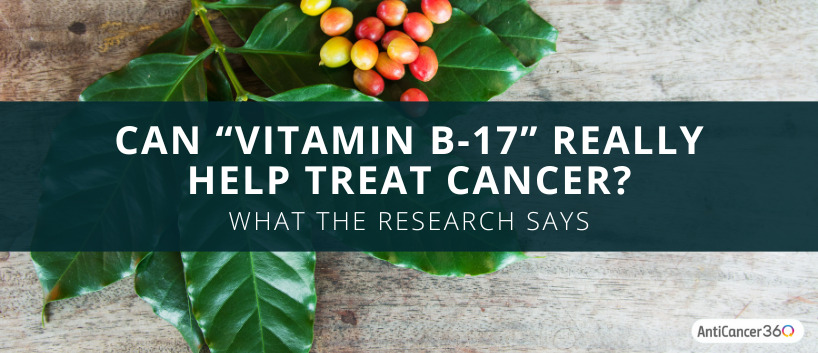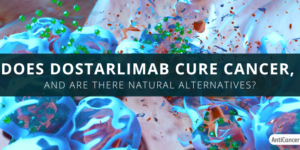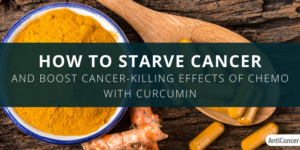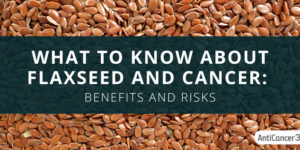Medical Disclaimer: The information in this article is meant for educational purposes only. It is not intended to replace a healthcare provider’s medical advice, diagnosis, or treatment. Consult a healthcare practitioner before taking any new medications.
When faced with a serious illness like cancer, it’s natural for individuals to seek out alternative treatment methods in addition to conventional medical interventions. Many products are promoted as “all-natural” cancer treatments. It can be challenging to sift through the data to figure out which ones are worth trying. The great news is there are many things that you can do in addition to your current oncology treatments to strengthen your battle with cancer… and you do not have to figure things out on your own.
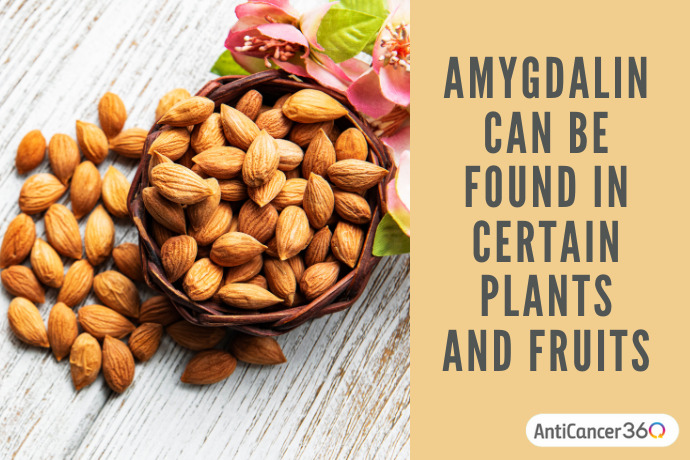
Anticancer360 can partner with you on your journey to defeat cancer. We are here to assist in navigating the world of anticancer approaches. Our mission is to provide the information you need to make informed decisions about popular integrative approaches, like incorporating natural substances (dietary supplements) and improving your nutrition while reducing sugar intake. Additionally, we explore the potential benefits of certain “off-label” medications for anticancer purposes.
One such natural substance is amygdalin, also known as “Vitamin B-17.” It’s a compound found in certain plants and fruits and has been suggested as a potential treatment for cancer. However, its effectiveness and safety are still debated among researchers and medical professionals, and more scientific evidence is needed to determine if it can be a beneficial option for people facing cancer [1].
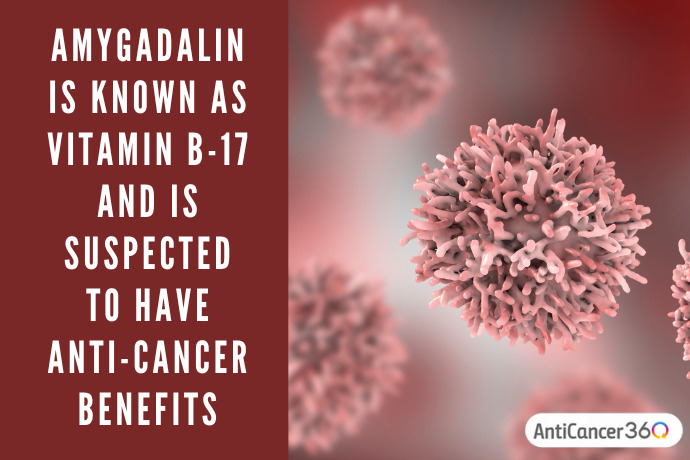
In this article, we will examine the current research on amygdalin and its alleged anti-cancer effects, shedding light on whether it can be considered a viable option for cancer treatment. Let’s take a closer look at the research surrounding this controversial topic.
What is Vitamin B-17 (Amygdalin)?
The name “Vitamin B-17” is a bit of a misnomer. There are no B vitamins involved. The actual ingredient is called amygdalin. Amygdalin is known by several other names, including laetrile, a chemical made from amygdalin, B17, and mandelonitrile. It is a naturally occurring chemical compound found primarily in the seeds of various plants, most notably apricot pits. Raw nuts, cherry seeds, bitter almonds, lima beans, and sorghum are also known sources of amygdalin. Amygdalin has long been used as an alternative medicine for treating cancer and other diseases, although there is limited scientific evidence to support the claims [2].
People with cancer often turn to alternative treatments, such as amygdalin, in an attempt to reduce the side effects of traditional treatments like chemotherapy. It is believed that this natural compound can help boost the immune system and reduce inflammation, both of which are important for fighting cancer. Additionally, it is believed to have anti-cancer properties by targeting cancer cells and killing them while leaving healthy cells untouched.
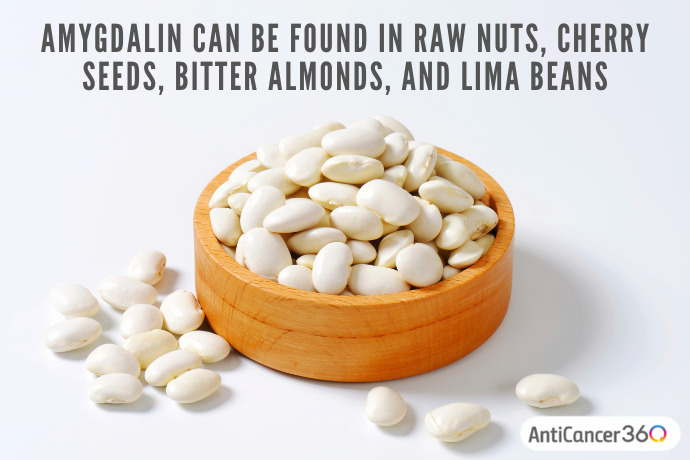
The debate over using Amygdalin as a treatment for cancer has been ongoing for decades. While there is some anecdotal evidence in favor of its efficacy, there is a lack of scientific data to support its use. As such, many medical professionals caution against the use of Amygdalin for treating cancer due to safety concerns, which we will review towards the end of the article.
Treating Cancer with Amygdalin
The use of amygdalin in treating cancer has been studied for decades, and there appears to be a growing consensus that it may have some benefit. Studies have shown that amygdalin can inhibit the growth of certain types of cancer cells in laboratory settings. It has also been suggested that amygdalin can reduce the side effects of chemotherapy and radiation therapy, although further research is needed to confirm these findings.
The Activity of Amygdalin on Normal and Cancer Cells
Amygdalin has been studied for its potential ability to kill cancer cells in the laboratory. This activity was evaluated in several studies by exposing both normal and cancer cells to different concentrations of amygdalin. In each case, the cell viability (ability to remain alive and functioning) was monitored over 24 hours [3],[4],[5].
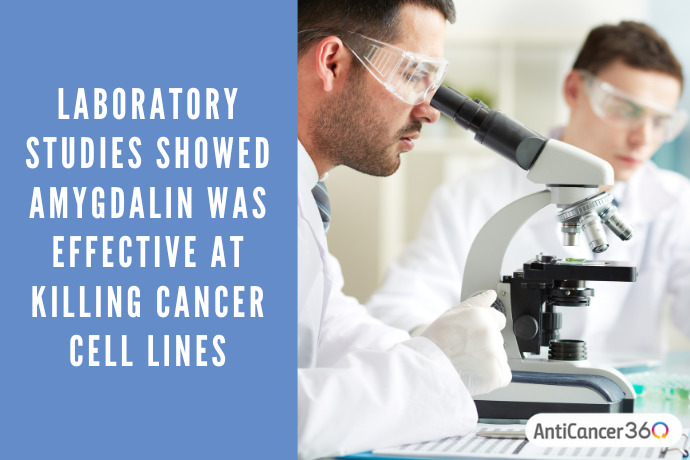
The results showed that amygdalin had a toxic effect on normal and cancer cells. However, it was more toxic to cancer cells than normal cells. The researchers also found that higher concentrations of amygdalin were more effective at killing cancer cells than lower concentrations.
The results of these studies showed that amygdalin does have the potential to kill cancer cells. However, the amount of amygdalin required to be effective varied greatly from one study to another, as did the types of cells used in each experiment. Furthermore, in many cases, normal cells were also killed by high concentrations of amygdalin.
These findings suggest that amygdalin may be able to selectively target and kill cancer cells while leaving healthy cells unharmed in a concentration-dependent manner. While further research is needed to confirm these results, they provide encouraging evidence for amygdalin’s potential as an anti-cancer therapy.
Anti-Tumor Effects on Triple-Negative Breast Cancer Cell Line
The anti-tumor effects of amygdalin on a triple-negative breast cancer cell line (HS578T) have been studied and found to be promising. In one study researchers studied the effects of amygdalin on the HS578T triple-negative breast cancer cell line. Triple-negative breast cancer is an aggressive type of cancer with no known cure, making it difficult to treat.
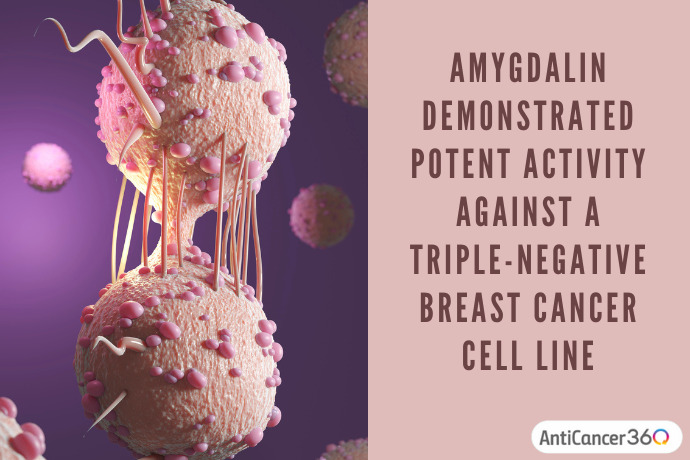
The researchers found that when treated with amygdalin, the HS578T cells experienced a significant reduction in their growth rate and an increase in cell death. This suggests that amygdalin may be effective in treating triple-negative breast cancer [6].
However, this study was conducted in a lab setting and further research is needed to assess the effectiveness of amygdalin in humans.
The Cyanide Controversy
One of the reasons why amygdalin is considered dangerous is its potential to release cyanide when ingested. The compound contains a cyanide molecule that is released when it comes into contact with certain enzymes in the body. High doses of amygdalin or laetrile can lead to cyanide poisoning, which can cause serious health problems or even be fatal.
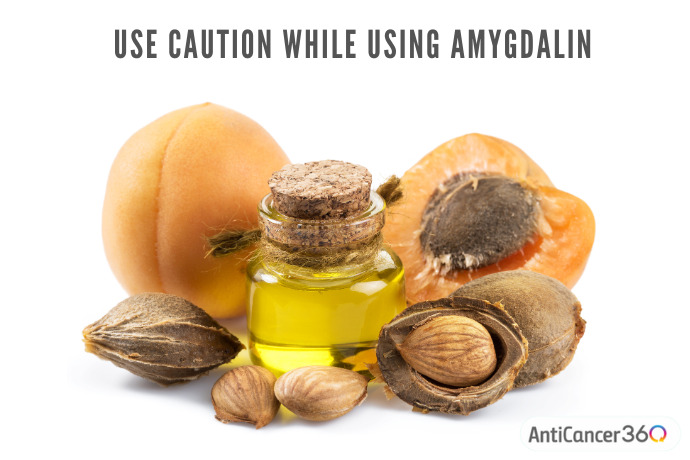
Proponents of amygdalin argue that cancer cells contain higher levels of these enzymes, making them more susceptible to cyanide poisoning than healthy cells. However, scientific studies have not supported this claim, and the risk of cyanide toxicity remains a significant concern.
The Importance of Evidence
When it comes to cancer treatment, it is crucial to rely on evidence-based medicine backed by rigorous scientific research. While the idea of a natural compound like amygdalin or laetrile selectively targeting cancer cells without harming healthy ones is enticing, it is essential to understand that anecdotal evidence and personal testimonials are not enough to substantiate its efficacy.
Numerous clinical trials and studies have been conducted to evaluate the potential anti-cancer properties of amygdalin, but the results have been largely disappointing. Some studies have reported toxicity and even deaths associated with the use of amygdalin as a cancer treatment.
While the allure of alternative cancer treatments is understandable, it is essential to approach these options with caution and skepticism. The scientific evidence surrounding amygdalin’s effectiveness in treating cancer is lacking, and its potentially toxic effects could pose serious risks to individuals seeking an alternative cure.
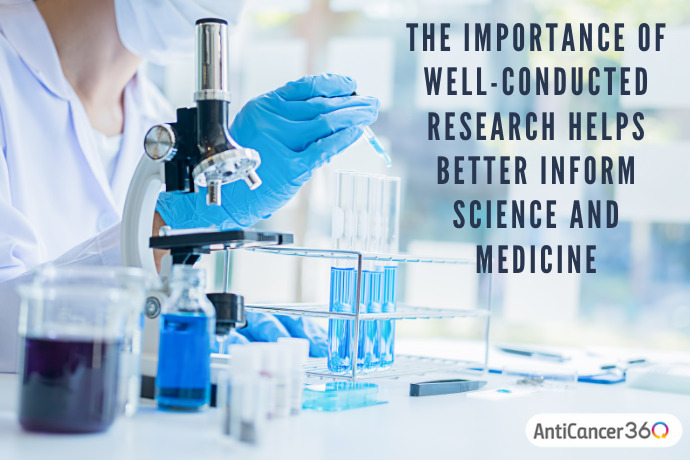
If you or a loved one is battling cancer, it is crucial to consult a qualified healthcare professional who can guide you through evidence-based treatment options. In the realm of cancer care, relying on proven methods and therapies is the best way to ensure the highest chance of successful outcomes and, ultimately, save lives
Common Questions about Amygdalin
Is amygdalin a natural cancer treatment?
As of now, amygdalin isn’t a recommended strategy due to potential toxicity and lack of beneficial evidence. So far, the research has only been conducted in cancer cell lines, and those results do not always translate into success in human studies.
Where can I buy laetrile?
Laetrile is available for purchase from various online retailers. We cannot speak to the claims made by the manufacturers and unaffiliated websites. Always discuss new medications and supplements with a healthcare professional before starting.
What are the side effects of laetrile/amygdalin?
The side effects of laetrile depend on the way it is given. Side effects are worse when laetrile is given by mouth. Side effects include nausea and vomiting, headache, dizziness, skin becoming blue caused by a lack of oxygen in the blood, liver damage, low blood pressure, droopy upper eyelid, trouble walking caused by damaged nerves, fever, and confusion [7].
The Bottom Line
Amygdalin, also known as laetrile or vitamin B17, is a substance that has been promoted as a natural treatment for cancer. However, it is important to note that there is scant scientific evidence to support the use of amygdalin as an actual cancer treatment. As stated earlier, amygdalin can be dangerous and potentially harmful. It contains cyanide, a highly toxic substance that can be fatal if consumed in large amounts. Moreover, the use of amygdalin as a cancer treatment can cause serious side effects and may interfere with conventional cancer therapies.
How Does AntiCancer 360 Help in the Fight Against Cancer?
We use an Aggressive Integrative Approach to cancer, the goal is to fight cancer from every possible direction. This practice includes integrating repurposed medications and natural supplements to fight cancer in an evidence-based, safe way that shouldn’t interfere with your oncology treatment.
How are you approaching your cancer treatment? Are you integrating any natural supplements or strategic dietary approaches? Have you considered medications for off-label cancer uses? Please feel free to share your experience or feedback in the comments below!
Are You A Good Candidate For Our Program?
If you’d like to learn more about the AntiCancer360 approach and see if we can help you, please watch our free online webinar to learn more. At the end, you’ll be able to schedule a free call with our team so that we can discuss your case in detail.
Dr. Andrew Cox is a graduate of the University of Pittsburgh and is part of the AntiCancer360 team as a consultant pharmacist and medical writer. He received his Bachelor’s degree in Biology from Marist College and a Master of Arts in Cell Biology from Villanova University prior to completing his Doctor of Pharmacy at Pitt. He also completed his Masters of Business Administration from the University of Maine. His expertise helps us create safe herbal and supplement combinations and avoid potential drug interactions.
Andrew has been a licensed pharmacist since 2013 with experience in outpatient retail pharmacy, long term acute care, and managed care pharmacy. He is interested in the appropriate utilization of natural substances to effectively prevent and treat cancer in addition to the traditional treatment strategies. He is also interested in the research and the latest findings of the mechanisms by which various natural compounds affect the tumor microenvironment
In his free time, Andrew enjoys traveling, reading, and the Premier League games on the weekends. He resides in Pittsburgh, Pennsylvania with his wife, daughter, and a boxer mix named, Party Martie.

